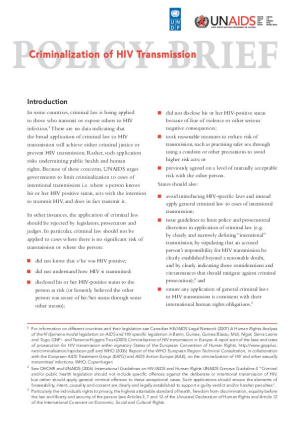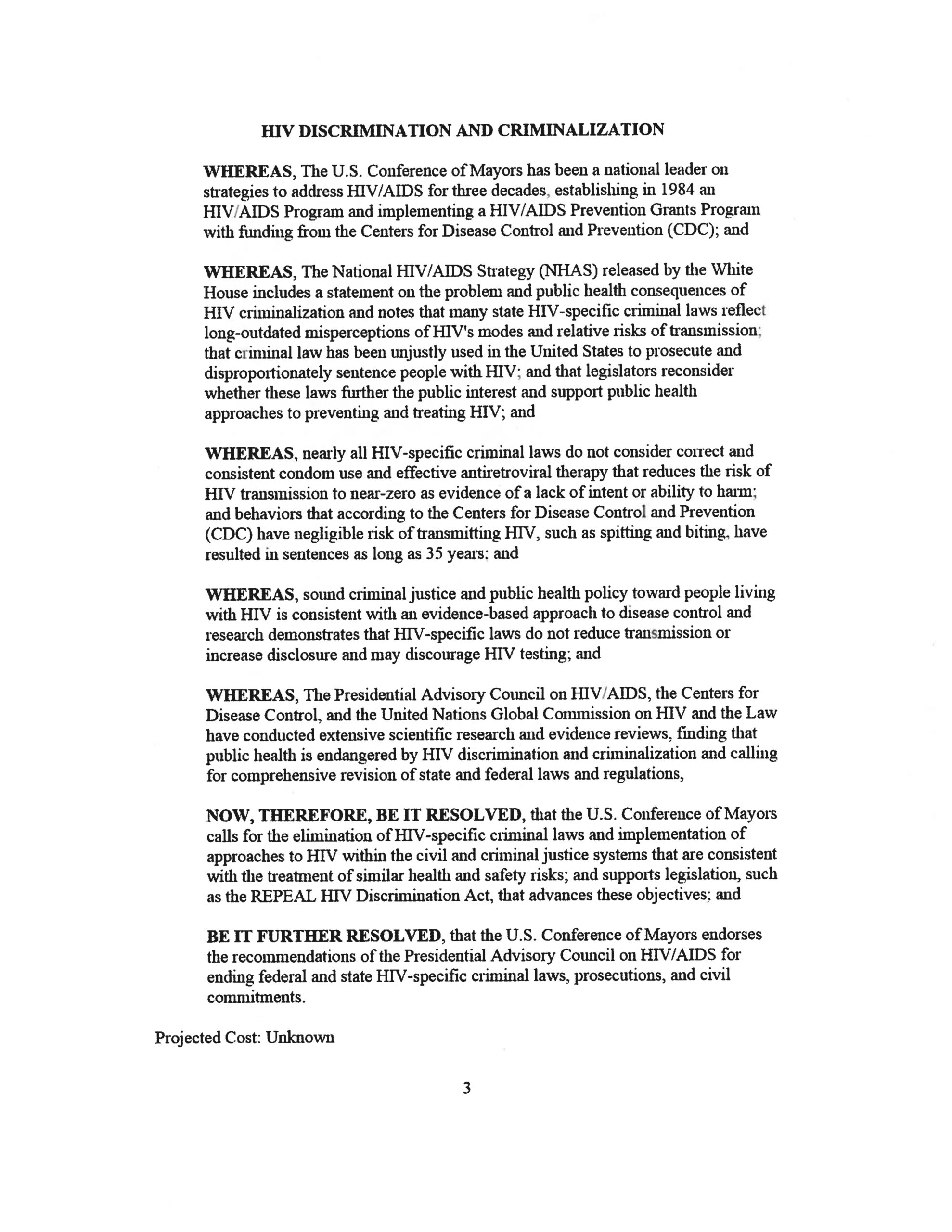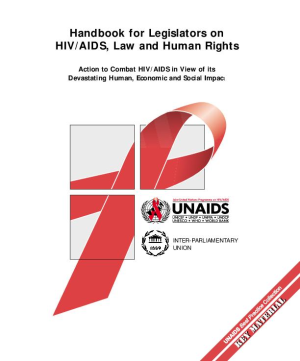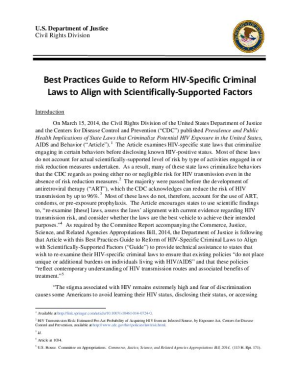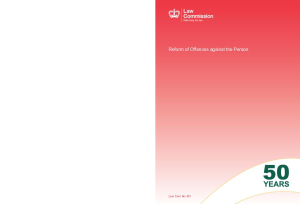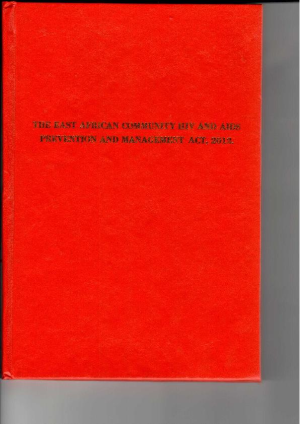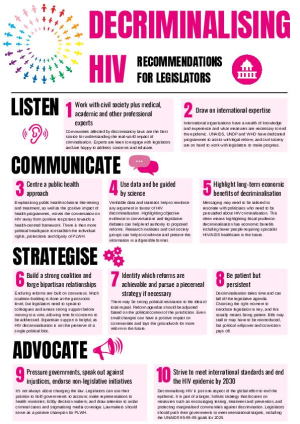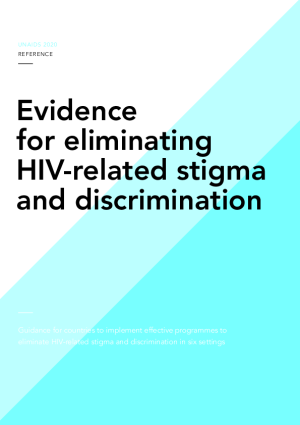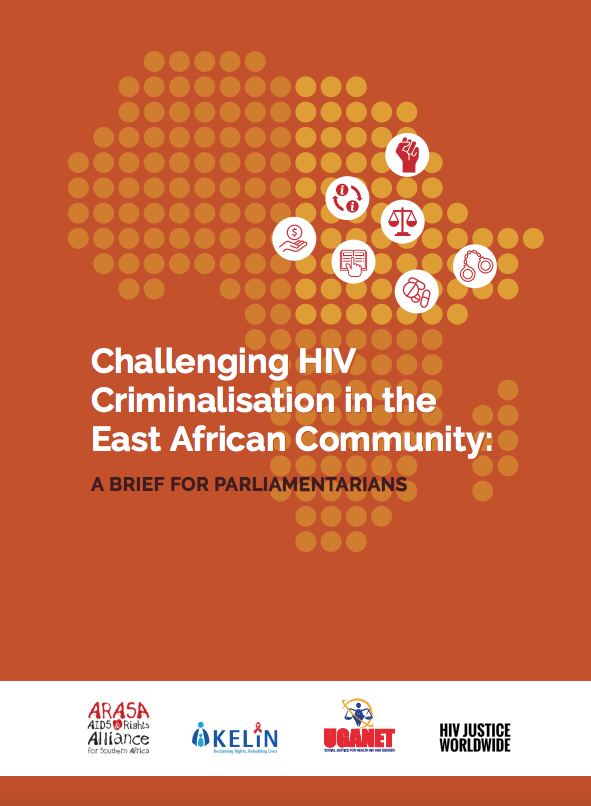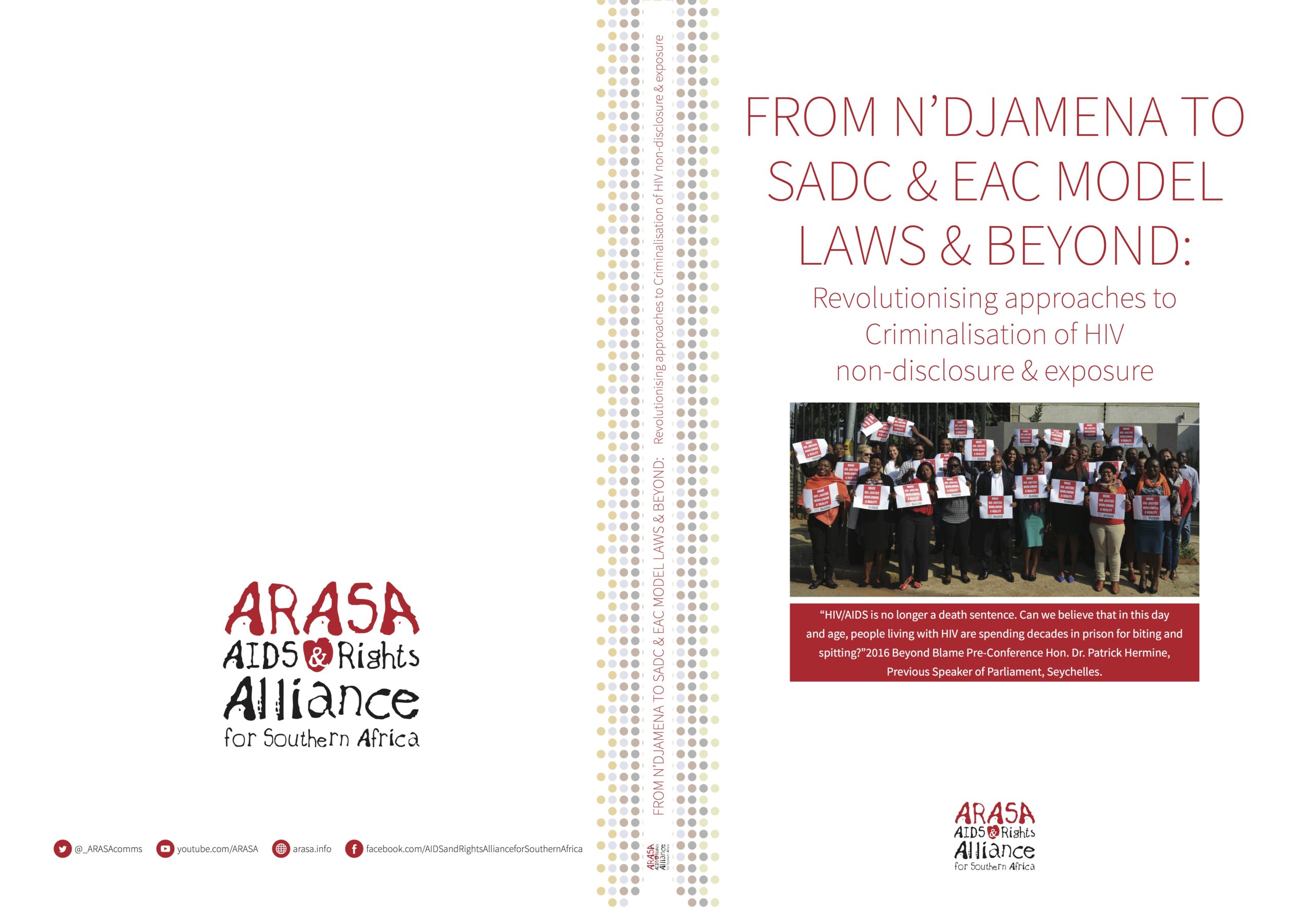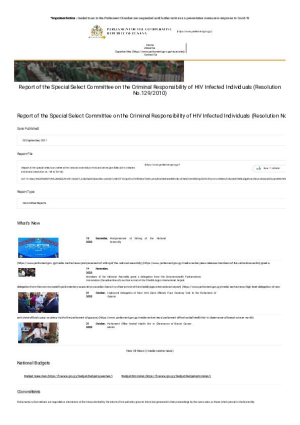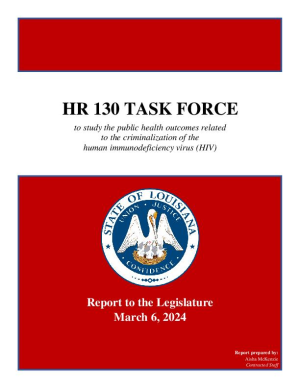Urges governments to limit criminalisation of HIV to cases of intentional transmission. Argues that criminal law should not be applied in a range of circumstances, including where there is no significant risk of transmission.
Legal education
Resources for policy & decision makers
Resolution on HIV Discrimination and Criminalization
Calls for the elimination of HIV-specific criminal laws and implementation of approaches to HIV consistent with the treatment of similar health and safety risks. Endorses the recommendations of the Presidential Advisory Council on HIV/AIDS for ending federal and state HIV-specific criminal laws, prosecutions, and civil commitments.
UNAIDS Handbook for Legislators on HIV/AIDS, Law and Human Rights
Aims to assist parliamentarians and other elected officials to undertake appropriate law reform and develop effective legislation to fight against AIDS. Provides examples of best legislative and regulatory practices from around the world. (This resource contains content that is broader than HIV criminalisation.)
- Alternative links
- French / Français
Effective Laws to End HIV and AIDS: Next Steps for Parliaments
Informs parliamentarians about the types of laws that are helpful and unhelpful in the AIDS response. Gives examples of legislation from around the world that has been effective in limiting the spread of HIV, and draws lessons from the experiences of parliamentarians involved. (This resource contains content that is broader than HIV criminalisation.)
- Alternative links
- French / Français,
Best Practices Guide to Reform HIV-Specific Criminal Laws to Align with Scientifically-Supported Factors
Provides technical assistance to states wanting to re-examine HIV-specific criminal laws to ensure that existing policies “do not place unique or additional burdens on individuals living with HIV/AIDS” and that policies “reflect contemporary understanding of HIV transmission routes and associated benefits of treatment.”
Reform of Offences Against the Person
Recommends replacing the outdated Offences Against the Person Act 1861 with a modified version of a 1998 draft Bill. Includes a detailed discussion of submissions by 35 concerned stakeholders (at chapter six: ‘transmission of disease’) .
South African Law Commission Report on Criminalisation of HIV Transmission
Presents findings from an enquiry undertaken at the request of the Parliamentary Justice Portfolio Committee following public pressure for ‘appropriate action’ regarding deliberate or knowing transmission of HIV infection. The report concludes that statutory intervention (HIV specific law) is neither necessary nor desirable.
The East African Legislative Assembly passes the EAC HIV & AIDS Prevention and Management Bill
April 2012 passing of the HIV & AIDS Prevention bill by the East African Legislative Assembly (Tanzania, Kenya, Uganda, Rwanda and Burundi). The bill offers a constructive alternative to the N’Djamena Model Laws promoting HIV criminalisation. The Bill followed strong actions by civil society including numerous stakeholder meetings of civil society and politicians.
Decriminalising HIV: Strategies and best practice for legislators
This report from the Global Equality Caucus collates expert insight and best practice examples on HIV criminal law reform. In a series of case studies from around the world, where some of the Global Equality Caucus’s members have led reform efforts, the report identifies several key lessons, takeaways and overarching themes for legislators to consider.
Decriminalising HIV – Recommendations for Legislators
Based on the research, studies and consultations that informed the report Decriminalising HIV: Strategies and best practice for legislators, The Global Equalities Caucus has identified several common themes across different regions and contexts and proposes 10 recommendations for legislators working to decriminalise HIV.
Evidence for eliminating HIV-related stigma and discrimination – Guidance for countries to implement effective programmes to eliminate HIV-related stigma and discrimination in six settings
This report reviews the latest evidence on what works to reduce HIV-related stigma and discrimination through key programmes to reduce stigma and discrimination and increase access to justice in the six settings of focus for the Global Partnership, including Justice. It includes guidance and recommendations for national governments and key stakeholders to implement programmes to empower populations “being left behind”; remove laws criminalising drug use or possession for personal use, all aspects of sex work, sexual orientation, gender identity, and HIV exposure, non-disclosure and transmission and to routinely review existing laws, regulations and policies relating to HIV.
- Alternative links
- Portuguese, French, Spanish, Russian
Malawi MPs use SADC Model Law on HIV to fight bad parts of HIV Bill
After nearly 10 years of intense debate and consultations, Malawi Members of Parliament voted to reject controversial provisions in their HIV (Prevention and Management) Bill. The Bill had included provisions that would have made HIV testing and treatment mandatory for specific people in a discriminating manner. Additionally, and perhaps more controversially, the Bill had sought, also, to allow criminalisation of HIV transmission, exposure and non-disclosure. This newsletter captures part of the debates leading to the passing of the final Bill.
Challenging HIV Criminalisation in the East African Community: A brief for parliamentarians
This brief aims to be an accessible tool for parliamentarians in the East African Community (“EAC”) to understand HIV criminalisation. It aims to equip them with the tools to address misinformation and stigma about HIV with facts, science and human rights, and to develop strategies to rationalise, modernise and improve communities’ legal responses to HIV.
From N’Djamena to SADC & EAC Model Laws and Beyond: Revolutionising approaches to Criminalisation of HIV non-disclosure & exposure
ARASA in collaboration with the HIV Justice Worldwide (HJWW) Consortium, convened a two-day meeting involving policy and law makers, members of the judiciary, lawyers, parliamentarians and representatives from civil society organisations from the East African, SADC regions and global North to revisit alternative approaches towards criminalisation and to accelerate a sustained momentum, strengthen collective action.
Report of the Special Select Committee on the Criminal Responsibility of HIV Infected Individuals (Resolution No.129/2010)
Report from GUYANA'S Special Select Committee of Parliament on the Criminal Responsibility of HIV Infected Individuals that chose not to make the transmission of HIV a criminal act, concluding that the transmission or exposure will be a major set-back in the country's existing national HIV response, and would undermine the excellent work that is currently being done locally to address HIV.
2023-2024 Report of HIV Criminalization (HR 130) Task Force
The Louisiana legislature created the HIV Criminalization Task Force (Task Force) during the Regular Session of 2023 through the unanimous passage of House Resolution 130, which was enrolled in June 2023. Pursuant to HR 130, the purpose of the Task Force was to study the public health outcomes related to the criminalization of the human immunodeficiency virus (HIV) and provide recommendations to modernize R.S. 14.43.5 to reflect both the realities regarding the routes and risks of transmission of HIV and to better serve the public interest in the Ending the HIV Epidemic initiative in Louisiana in a final report of its findings prior to the convening of the 2024 Regular Session of the Legislature of Louisiana. The report makes legislative recommendations for consideration by the Louisiana State legislature .

